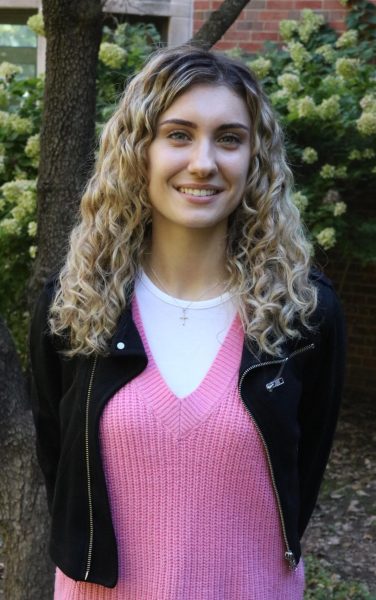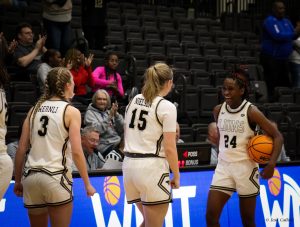Study Abroad: Lindenwood student explores Italy

Photo from Celinda Hefner
February 18, 2022
The study abroad program at Lindenwood University gives students the opportunity to spend a semester outside of the United States and earn college credits.
Each year, many Lindenwood students participate in a study abroad program that opens new doors and opportunities as well as gives international experience. Through this program, students can learn new languages, learn about cultures, and see the world.
Lindenwood student Celinda Hefner is currently enrolled in the program and is spending her spring semester in Italy. Hefner is studying at the University of Modena and Reggio Emilia in Reggio Emilia, Italy.
Hefner shares what her experience studying abroad has been like so far, and some of the differences in education internationally as compared to in the United States.
Q: What does your usual day look like?
A: I usually wake up around 9 or 10 every day, depending on what time I have class. I eat breakfast in my apartment or grab a pastry somewhere on the way to class, which is super cheap here around one or two euros. The walk to class is about 12 minutes and a very pretty walk, especially now that the weather is in the high 50s and even 60s some days. After class, I usually go back to my apartment, take a nap, watch Netflix (which has very different things here), do homework, etc. There’s a nice cafe close to my apartment which has some more American coffee and food that me and my friends will go to and do homework sometimes.
Q: What places have you already been to and what places are you planning to visit?
A: On the weekends me and my friends usually go on a weekend trip. So far, we have been to Bologna, Florence, Rome, and Crema. I have a trip already booked for Belfast, Ireland for St. Patrick’s Day. I am also planning on going to Paris, Greece, Germany, and Venice. These are tentative and there is definitely more to be planned, I’m sure.
Q: How is the education approach and style of teaching different?
A: Honestly, they don’t give as much instruction or rules to follow for assignments. I’ve struggled with some assignments in my classes as they leave it very open-ended and very little to no instructions to follow. Some of my classes also don’t really do PowerPoints where we take notes or do practice assignments. It’s mostly just them [the professors] talking to us, which don’t get me wrong is very interesting to hear about, but I don’t always know if I should be taking notes or not or how to prepare for quizzes or tests. I think that is just the “Reggio Emilia approach” to teaching, being very open and giving us creativity.
 Q: Culture shock is quite common among study-abroad students. What is your personal experience of facing cultural differences?
Q: Culture shock is quite common among study-abroad students. What is your personal experience of facing cultural differences?
A: Something surprising to me was what time they eat dinner here and the hours places are open. I’m used to eating dinner around 6 back home, but here dinner places don’t even open until 7. We are usually eating dinner closer to 8 or 8:30. Stores and restaurants always close for a break during the afternoon and open back up later. Italians also stare at you. A lot. Sometimes I don’t know if it’s because I look American or the way I’m dressed, but our advisors here told us that Italians staring is very common.
Q: Anything else you would like to share about your experience?
A: The process of getting here and adjusting was very difficult, stressful, and draining, but it is so worth it. If you love to travel and have thought about studying abroad, you should totally take advantage of this time. I think college is a perfect time, especially as a sophomore or junior. As an education major, I’m studying abroad before I start student teaching, which I think is a perfect time.









